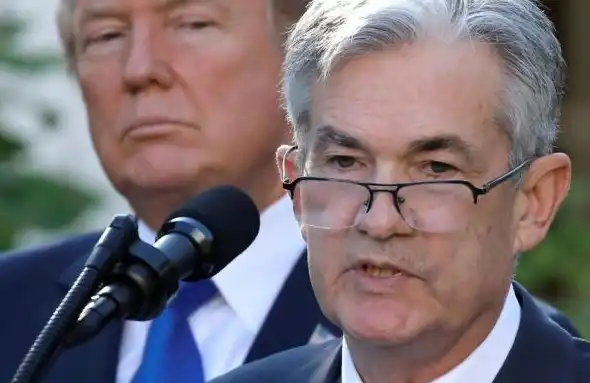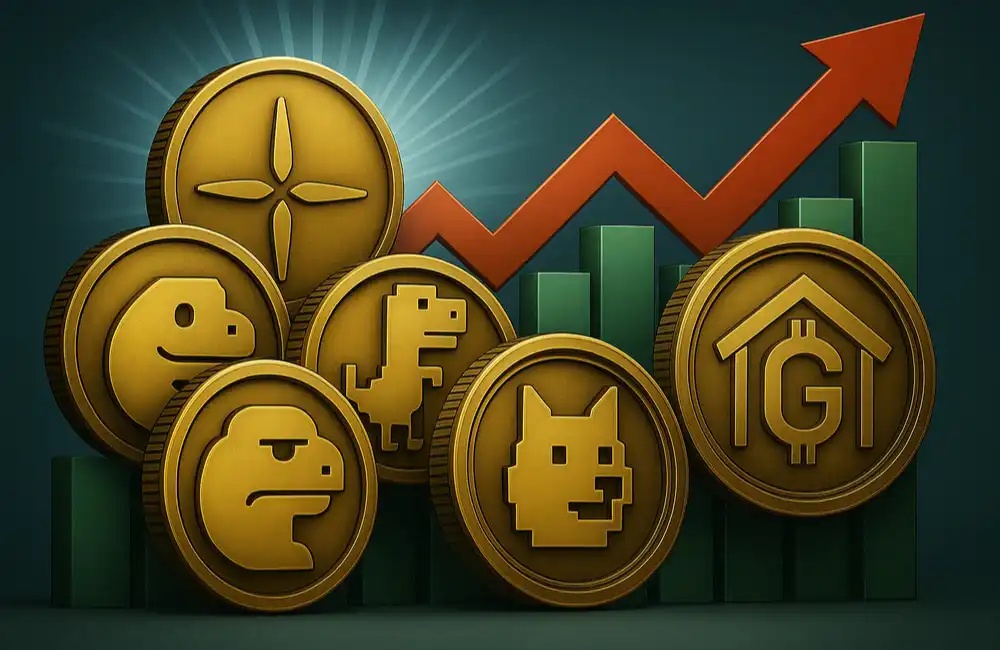Crypto Wealthy Individuals Toast to Each Other, Resolving a $1 Billion Feud - The Unwritten Rule of the Crypto World
On April 5, 2025, amidst the nightfall at Victoria Harbour, the "BUIDL 2025" Web3 Industry Summit was taking place. Amidst the clinking of glasses, a group photo quickly went viral: Huobi Founder Li Lin, Binance Founder CZ, and TRON Founder Justin Sun were center stage, raising their glasses in celebration, with beaming smiles, surrounded by other cryptocurrency industry leaders.

Another even more eye-catching photo circulated during the conference—Justin Sun and Li Lin embracing each other and toasting. Just two months prior, Justin Sun had publicly criticized Li Lin for concealing a Huobi financial loophole. The two had been at odds, unwilling to yield an inch. Had only two months passed before they put aside their past grievances?

These two photos seemed to encapsulate a glimpse of the "Golden Age" of the cryptocurrency industry—where underlying tensions coexisted with intertwined interests. Their appearance together not only reflected the delicate nature of personal relationships but also bore witness to the cryptocurrency industry's evolution from grassroots to compliance. Below, the editor will guide readers through the love-hate relationships among industry titans.
Li Lin and Justin Sun: Unresolved Debt Dispute
Li Lin and Justin Sun had a significant dispute over the Huobi acquisition issue, well-known within the industry. The origin of the matter can be traced back to October 8, 2022, when Huobi's founder Li Lin sold his Huobi shares to Hong Kong-based Matrixport, affiliated with Justin Sun. Three years after the completion of the transaction, in February 2025, Justin Sun suddenly accused Li Lin of withholding due diligence materials, claiming there was a $30 million "financial pit" within Huobi that he needed to personally cover.

In response, Li Lin published a lengthy article stating that at the time of the 2022 transaction, there was a discrepancy between the two parties regarding the calculation of user assets, with sufficient reserves set aside. He mentioned that the "30 million USD fund hole" Sun had referred to was a result of a margin call during the operation of the exchange's margin business due to extreme market conditions. The financial handling had already been completed using company revenue, and therefore should not be considered an undisclosed "financial loophole."
In reality, this was not the first conflict between the two individuals, as Sun and Li's feud began shortly after the sale of Huobi.
In May 2023, Justin Sun accused Li Lin's brother, Li Wei, of illicitly acquiring a large amount of zero-cost HT through improper means and selling it off. He stated that in order to protect the rights of the HT community, he intended to recover and destroy these tokens. Subsequently, Huobi Founder Li Lin responded on social media, requesting evidence from Justin Sun. Li Lin expressed that if it were confirmed that Li Wei had acquired the zero-cost HT through illegal means, he would personally compensate Huobi at a tenfold rate of HT tokens; if proven otherwise, he hoped Huobi would return the legitimate assets to its users.

Subsequently, Sun Yuchen did not provide conclusive evidence, and the accusatory tweet was also deleted. Although it sparked widespread community questioning of Huobi's internal management, ultimately this exposé came to nothing. However, the grievances between Li Lin and Sun Yuchen did not end there. In February 2025, due to a $30 million "financial loophole," the two cryptocurrency industry leaders once again engaged in a public opinion war on the internet.
Moreover, the photo of Sun Yuchen and Li Lin embracing and toasting each other at the conference added a new layer of speculation to their relationship. In the photo, the two were chatting and laughing warmly, showing intimate behavior as if they were long-lost friends, not like two individuals who had a $30 million financial dispute just two months prior. This may be a performance by cryptocurrency industry leaders in public settings, or perhaps a reconciliation in private after burying the hatchet. The relationship between Sun and Lin remains a mystery of "love and hate."
Speaking of toasting, Li Lin was not the first to toast with other cryptocurrency industry leaders. Back in 2018, Li Lin drank and toasted with the founder of OKEx (predecessor of OKX), Xu Mingxing, while eating barbecue by the roadside. They also toasted at dinner parties. When OKEx was unable to process withdrawals that year, Xu Mingxing was taken for tea, and Li Lin openly supported him in the community. Although there was an element of performance, it indeed expressed the mutual respect among entrepreneurs in the cryptocurrency industry—a time full of opportunities and risks—and their shared vision to strengthen and enhance the cryptocurrency industry. Later, Xu Mingxing praised Li Lin: "A toast makes true brothers. Thanks to Huobi's Li Lin for standing up to heal my pain."

CZ and Sun Yuchen: Foes and Friends, Love-Hate Relationship
Sun Yuchen and CZ are both regarded as leaders in the crypto space. Sun Yuchen founded TRON under the Tron Foundation and HTX under Huobi, while CZ founded Binance. Their projects have formed both an ecosystem of cooperation and competition. They have both graced the cover of Forbes magazine, showcasing their global influence. As industry pioneers, the journey they have shared reflects the history of the cryptocurrency industry.
As early as 2015, He Yi, Sun Yuchen, and Luo Min, the CEO of Qudian, appeared together on the reality show "The Next One Is Not You," dressed in jumpsuits with goat horns and white hats, performing a song called the "Distorted Goat Song." At that time, He Yi and CZ had only known each other for a year, working together at OKCoin, with He Yi as a vice president and CZ as the CTO. The gears of fate quietly turned, and these young people, still immersed in the excitement of entering a new industry, may have found it hard to imagine that they would later reshape the cryptocurrency industry.

The early years of the crypto world were full of endless possibilities and imagination, with Justin Sun and CZ in a stage of mutual cooperation and mutual accomplishment.
In October 2018, Justin Sun and CZ met at the Geneva World Investment Forum. At that time, it was the 73rd anniversary of the United Nations, and Binance established the Blockchain Charity Foundation, launching a blockchain-based donation platform to support countries such as Uganda affected by floods and landslides. The Tron Foundation also donated $3 million to support blockchain charity.

2019 was the "honeymoon period" for Justin Sun and CZ. On January 28, BitTorrent (BTT), a project previously acquired by Justin Sun, completed the issuance of 5.94 billion BTT on Binance's blockchain asset issuance platform, Binance Launchpad, in about 14 minutes, raising $7.1 million. BitTorrent became Binance's first IEO project, marking the beginning of CZ and Justin Sun's early cooperation. In April, after TRON launched TRC20-USDT, Binance quickly provided support and launched the "Earn 16% APY by Staking TRC20-USDT" activity, bringing in a large amount of liquidity to the TRON ecosystem. At the same time, Justin Sun frequently praised Binance on Weibo and Twitter, vigorously promoting this collaboration. During that time, their cooperation was exemplary—Justin Sun leveraged Binance's platform influence to promote the TRON ecosystem, while Binance used TRON's new chain and high-interest subsidies to attract more USDT users, achieving a win-win situation.
In September 2019, Binance partnered with Paxos Trust Company to launch the stablecoin Binance USD (BUSD), which surpassed a market capitalization of $1 billion in less than two years. On September 5, 2022, shortly after BUSD's market cap reached $20 billion, Binance announced that it would stop using USDC, USDP, and TUSD, three stablecoins competing with BUSD, officially declaring war on the stablecoin giant USDC.
The successful issuance and tremendous success of BUSD allowed CZ to step by step build his crypto empire leveraging the platform's strengths. Just one month after Binance announced the redemption plan, on October 28, 2022, Huobi Global, which had just been taken over by Justin Sun for 20 days, issued a notice that HUSD triggered the Eleventh Article of Huobi Global's Token Management Rules, suspending the trading of HUSD and delisting it on the same day, with user accounts' HUSD being directly exchanged for USDT. This news caused a stir in the market, with HUSD losing its peg and its value rapidly plummeting to $0.3 on November 1, leading to a total collapse and complete withdrawal from the stablecoin competitive market.

Interestingly, HUSD is also a stablecoin project launched by Huobi in collaboration with Paxos. In a one-year anniversary blog post in July 22, the Paxos team wrote: "Paxos now supports 3 of the top 6 stablecoins in the world, and we are proud of it. As the first regulated trust company and qualified custodian of digital assets, Paxos has unique expertise in this market."
Shortly after the anniversary blog post, Paxos co-founder Rich Teo appeared at a high-end restaurant overseas with Binance CEO CZ, causing quite a stir in the crypto community. Two months later, HUSD was announced to be discontinued, with Paxos becoming the "full-time custodian" of BUSD. Speculations arose within the community that this dinner meeting might have involved strategic discussions about the stablecoin market, which could have influenced Huobi's decision regarding HUSD. However, these speculations lacked direct evidence and did not receive official confirmation.

Related Read: "The Four-Year Rise and Fall of the $15 Billion Stablecoin Empire: The Ambition and Regret of BUSD"
Two months after the delisting of HUSD, on December 30, 2022, Binance announced the completion of the integration of Binance-Peg BUSD on the TRON network. Deposits and withdrawals of BUSD are now available on the TRON network, and Justin Sun actively promoted the collaboration with Binance on Twitter. Regardless of any previous private disagreements between the two regarding stablecoin partnerships, at least for now, everything seems to be in a prosperous and harmonious state.

However, the two are still engaged in a behind-the-scenes game regarding stablecoins.
In May 2023, Justin Sun transferred 405 million TUSD to Binance, allegedly for participating in the Binance LaunchPool's SUI token mining activity. This sparked a debate in the crypto community, with some believing that CZ was assisting a whale by allowing Justin Sun to acquire the new token SUI through Binance's exchange pool incentives, accusing such actions of being involved in "insider trading." As the public opinion intensified, Justin Sun responded that the initial purpose of the transfer was to act as a TUSD market maker to "smooth out the price difference" and improve liquidity, not to participate in the activity, and that the portion of the funds mistakenly involved in the activity had been contacted with the exchange for a refund. Subsequently, CZ also publicly stated that if Justin Sun used these TUSD to participate in mining, action would be taken against him, emphasizing that LaunchPool is a service for retail users, not "whales." A $405 million farce came to an end in the disclaimers of the two bosses.

It is worth noting that TUSD is the "successor token" to BUSD. On February 13, 2023, SEC enforcement officials in the United States issued a "Wells Notice" to Paxos, stating that the BUSD issued and listed by Paxos is an unregistered security and planned to sue Paxos for violating investor protection laws. Under strong regulatory intervention, Binance continuously delisted BUSD trading pairs, and BUSD, which once had a market value of up to $22 billion, gradually exited the stage of history. Subsequently, Binance shifted its focus to another stablecoin—TUSD. Binance took a series of measures, such as adding TUSD trading pairs, opening TUSD Pool on Launchpool, and offering zero-fee trading for the BTC/TUSD pair, vigorously supporting the BTC/TUSD pair. By March 2023, the BTC/TUSD pair surpassed the BTC/USDT pair to become the largest trading pair by volume on Binance. After discontinuing BUSD, Binance's support for TUSD, USDC, and other stablecoins also put pressure on Sun Yuchen's TRC-USDT.
Related reading: "TUSD, it's time to get to know this rising star at Binance again"
On April 3, 2025, Sun Yuchen suddenly accused First Digital Trust (FDT) of being insolvent and unable to redeem client funds. FDT is the issuer of the stablecoin FDUSD and the asset management institution for TUSD. That afternoon, Sun Yuchen stated in a live press conference that as early as 2023, Techteryx had investigated FDT and found that a large amount of client funds under custody had been misappropriated. At that time, Sun Yuchen personally provided assistance to Techteryx with his own funds to ensure that TUSD had sufficient liquidity. TrueCoin was suspected of colluding with FDT to illegally transfer $456 million of TUSD reserve to a company in Dubai. First Digital subsequently responded to the allegations, stating that the dispute only concerned TUSD and had no connection to FDUSD, and that First Digital had more than enough ability to pay.
Undoubtedly, this move and Binance's subsequent suspected behavior of "only notifying large holders in small groups and then dumping on retail investors" once again put CZ and He Yi in an emergency PR crisis, triggering market dissatisfaction with centralized exchanges. Sun Yuchen's role in this controversy appears much more upright, exposing insider trading in capital and safeguarding the rights of all investors. Perhaps Sun Yuchen's original intention was only to reclaim his $500 million deposit, which is not directly related to Binance. However, when FDUSD briefly decoupled, Binance found itself embroiled in a public opinion battle.
Despite the competition between the two in the business aspect, in the cryptocurrency circle's public events, Justin Sun has spoken up for CZ multiple times. Following the eruption of the SEC's lawsuit against Binance in June 2023, Sun openly expressed his support for CZ on social media, stating, "As a friend of CZ, I am willing to steadfastly support CZ and believe that justice will prevail." In November 2023, CZ announced his resignation as Binance CEO, and Sun highly praised CZ's contributions on social media, mentioning their nearly decade-long acquaintance, affirming his leadership and industry-driving force, stating that he "has propelled the industry to unprecedented heights," and emphasizing continued collaboration with Binance in the future.

As the "brotherhood toast" photo of Li Lin and Justin Sun flooded social media, as CZ and Justin Sun laughed heartily at a summit, onlookers found it challenging to distinguish whether this was a superficial show or a genuine reconciliation. However, perhaps the answer is not crucial—within the crypto industry, a consensus of interests is far more cohesive than personal grievances. From the early days of the grassroots community to the current wave of compliance, the history of these tycoons' maneuvering is precisely a footnote to the industry's evolution. Their feuds and collaborations are fundamentally exploring a path that aligns with regulatory frameworks without losing sight of the blockchain's original aspirations.
Just as Justin Sun stated in an interview with Forbes: "A true innovator must adhere to long-termism." As the smiles in the group photo freeze in time, the night in Hong Kong continues to shine brightly, and the script of the crypto industry continues to unfold—the next scene may be a more intense competition or a renewed collaboration amid crises. The only certainty is that the allure of this industry lies within the stories of these "frenemies."
Welcome to join the official BlockBeats community:
Telegram Subscription Group: https://t.me/theblockbeats
Telegram Discussion Group: https://t.me/BlockBeats_App
Official Twitter Account: https://twitter.com/BlockBeatsAsia
 Forum
Forum OPRR
OPRR Finance
Finance
 Specials
Specials
 On-chain Eco
On-chain Eco
 Entry
Entry
 Podcasts
Podcasts
 Data
Data


 Summarized by AI
Summarized by AI







